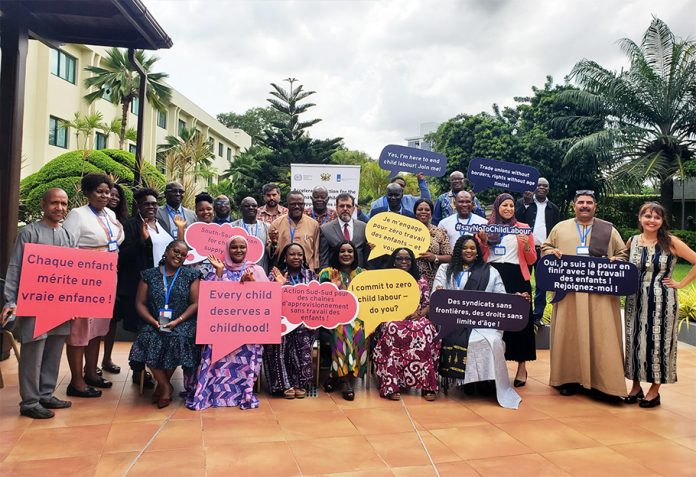Trade unions from eight African countries have gathered in Accra for a landmark regional forum organised by the International Labour Organisation (ILO) to intensify efforts to eliminate child labour in agricultural and artisanal mining sectors across the continent.
The four-day event, which runs from May 20 to 23, 2025 is being held under the theme: “Developing Meaningful Partnerships Among Trade Unions to Eliminate Child Labour in Supply Chains.”
It brings together worker organisations from Ghana, Côte d’Ivoire, Nigeria, Kenya, Egypt, Uganda, Malawi, and Mali, with the goal of building South-South partnerships, sharing best practices, and unveiling a cross-country action strategy to protect vulnerable children and promote decent work.
David Marcus, Officer-in-Charge of the ILO Ghana Office, stressed that child labour is not only a violation of workers’ rights but also of children’s rights, urging trade unions to play a stronger role in combating the menace.
“Unions will never stay quiet in the face of injustice. This issue automatically calls for their involvement,” Marcus said at the opening ceremony.
“However, the environment has changed – representing workers is more difficult in rural and gig economies. Many workers do not even recognize themselves as part of a collective, which makes them easy targets for exploitation.”
Highlighting the need to clearly distinguish between child labour and child work, Arezki Mezhoud, Secretary General of the Organisation of African Trade Union Unity (OATUU), warned that misconceptions continue to hamper progress.
“There is still confusion between child labour and child work. We are concerned with labour – any work that negatively affects a child’s physical development, education, or morality,” Mezhoud said.
“A child should be in school, not carrying heavy loads or exposed to agrochemicals. That is the worst form of child labour.”
He revealed that Ghana has made commendable progress in tackling the issue through models like the “Child Labour Free Zones,” currently being piloted in communities such as Aveme and North Dahi and around Lake Volta.
“When you eat tilapia in Accra, you should know it’s not from the sweat or blood of a child,” Mezhoud declared.
“We’ve established systems at places like Trupo Farms and the West Africa Fish Depot where child labour is completely banned. These are now safe zones.”
He also touched on how illegal mining – locally known as galamsey – is undermining efforts to protect children and the environment.
“Galamsey is destroying cocoa production, poisoning water bodies, and endangering entire communities,” Mezhoud said.
“We call on the government to reclaim degraded lands and ensure that those responsible are prosecuted.
“Communities affected by illegal mining must be given free medical care due to exposure to chemicals like mercury and cyanide.”
The ILO’s ACCEL Africa project, funded by the Ministry of Foreign Affairs of the Netherlands, is supporting this forum as part of its broader mission to accelerate the elimination of child labour across Africa.









